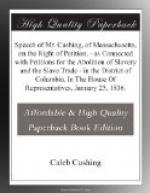of the subject out of doors, by refusing to receive
petitions. On the contrary, you give the petitioners
new force and efficiency, by giving them a new cause
of complaint and of excitement. Nor do you attain
any thing, so far as this House is concerned; for,
by shutting out petitions, you do not shut out debate;
any member of the House can bring on debate any day,
by moving some general resolution applicable to the
subject. On the other hand, if it be so certain
that Congress have no power in this matter, or having
power, ought not to exercise it, then let the House
establish those points in the usual way, by a deliberate
report, elaborated in the closet, by a committee of
the ablest men upon this floor, and considerately
adopted by the House. The argument by which this
course is withstood, goes upon a false assumption.
It assumes for granted, that the People of the United
States are not to be reasoned with; that their opinions
can be put down by bold and broad assertions at this
or the other end of the Capitol; and that they are
not to be trusted with the facts and law of the case.
Here, again, as I conceive, gentlemen forget that this
government is a republican one, resting exclusively
in the intelligence and virtue of the People.
I, for one, am willing they should look into any of
the clauses of the Constitution, and be fully informed
of the merits of every question arising under it,
never doubting that, in the end, their decision upon
it will be just, true, and patriotic. Or is it
that gentlemen are afraid to meet a proper scrutiny
of the subject? Do they shrink from a fair and
full examination of its merits or demerits?
Sir, allusion has been made, in an early stage of
this debate, to the history of the excitement which
once pervaded a considerable part of the country,
in reference to the transportation of the mails on
the Lord’s day. It is undoubtedly a pregnant
case, directly in point. But I have another case,
yet more cogent and pertinent.
Within less than one year after the adoption of the
Constitution, there came to Congress petitions, chiefly
from New York, Pennsylvania, Maryland, and Virginia,
and especially from the Society of Friends, praying
Congress to suppress the slave trade, and to interpose,
in various ways, within the limits of the several
States, in the melioration of the condition of the
colored population of the South. I have examined
the journals giving the record of the proceedings
in this House; I have looked into the history of the
times, to understand the grounds of the disposition
then made of those petitions. In the outset, I
will observe, that the debates on the subject present
a remarkable parallel with what has taken place under
my own eyes in this House. Messrs. Jackson, Baldwin,
Tucker, Smith, and some other gentlemen from the South,
insisted, as we now hear it insisted, that the petitions
should be summarily rejected, without commitment.
They alleged the same reasons; such as unconstitutional




